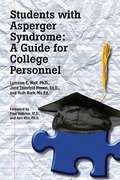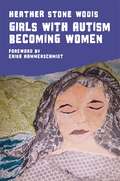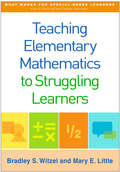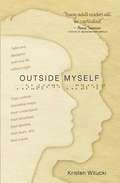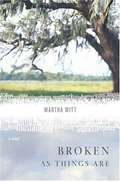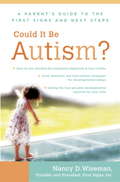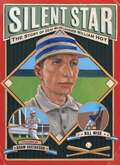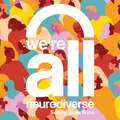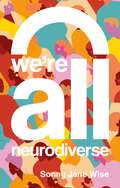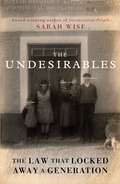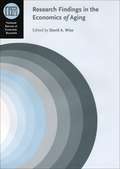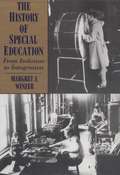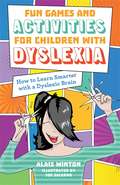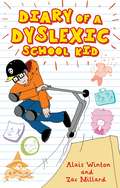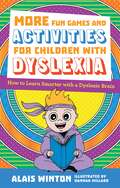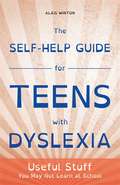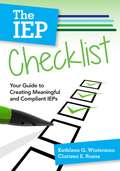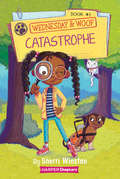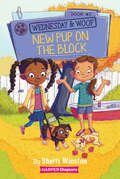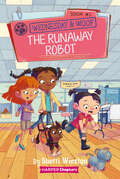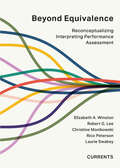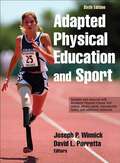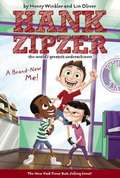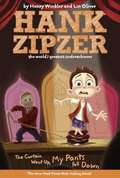- Table View
- List View
Students with Asperger Syndrome: A Guide for College Personnel
by Lorraine E. Wolf Jane Thierfeld Brown G. Ruth Kukiela BorkFor many students with autism spectrum disorders, getting admitted to college is the easy part. Surviving and succeeding can be quite another, as these students transition into a system that is often unprepared to receive them. Accommodating students whose disabilities very likely fall in social and self-regulatory areas is a particular challenge for disability services providers who are not used to reaching out into so many areas of student life. This comprehensive book offers disability services professionals practical strategies for accommodating and supporting students in all phases of college life and beyond.
Girls with Autism Becoming Women
by Heather Wodis Erika HammerschmidtThis insightful book investigates the experiences of seven women with autism as they transition from childhood to adulthood, and how they make sense of that journey. Taken from the autobiographies of women including Liane Holliday-Willey and Temple Grandin, these accounts shine a light on issues unique to women with autism. Heather Stone Wodis provides a detailed and thoughtful exploration of their common experiences, and each story offers a new perspective that illuminates the diagnosis from a different angle. This is a fascinating look at how generational differences, such as access to the internet, can provide more avenues toward self-expression, political mobilization, and advocacy. It also explores the idea that, no matter the era, the unyielding support of family and a diagnosis in childhood can help girls with autism transition toward adulthood.
Teaching Elementary Mathematics to Struggling Learners
by Bradley S. Witzel Mary E. LittlePacked with effective instructional strategies, this book explores why certain K-5 students struggle with math and provides a framework for helping these learners succeed. The authors present empirically validated practices for supporting students with disabilities and others experiencing difficulties in specific areas of math, including problem solving, early numeracy, whole-number operations, fractions, geometry, and algebra. Concrete examples, easy-to-implement lesson-planning ideas, and connections to state standards, in particular the Common Core standards, enhance the book's utility. Also provided is invaluable guidance on planning and delivering multi-tiered instruction and intervention.
Outside Myself
by Kristen WituckiExtraordinary insight into living without sight Outside Myself will enlighten both young and old.
Broken As Things Are
by Martha Witta novel about the complex relationship between a young girl and her older brother with autism
Could It Be Autism?
by Nancy WisemanIf you have questions or concerns about your child's social, emotional, or behavioral development, you're not alone. The number of children affected by autism--an umbrella term for a wide spectrum of disorders that includes "classic" autism, Asperger's syndrome, and Rett syndrome--is growing every year. Most children are not diagnosed until they start school. But developmental problems can be recognized in infants as young as four months old. Early intervention can vastly improve a child's chances for a successful outcome and recovery. Could It Be Autism? provides vital information so you can recognize the red flags of developmental delays and begin treatment based on those first signs. Nancy Wiseman is the founder and president of First Signs, the organization dedicated to educating parents, clinicians, and physicians on the early identification of and intervention for developmental delays. She is also the mother of a child who was diagnosed with autism at the age of two, and she draws on her own experiences as well as the latest research to present real strategies. Emphasizing warning signs, she describes the most important milestones at each stage of a child's growth, including things parents and pediatricians often overlook. She also empowers parents to act on their instincts and initial concern, rather than to "wait and see," which is often encouraged. The book explains the steps parents can take to confirm or rule out a developmental delay or disorder. It details various diagnoses and show how sometimes multiple diagnoses may apply. But even more valuable is the information on how to design and implement the best intervention plan based on a child's unique developmental profile. Different treatments and therapies are outlined so parents can explore and understand what may work best for their child, based on his or her particular strengths and weaknesses.Ultimately, Could It Be Autism? is about giving parents hope--hope that they can know one way or the other where their child is developmentally and hope that they can give their child what he or she needs to have the best life possible.
Silent Star: The Story of Deaf Major Leaguer William Hoy
by William WiseThe biography of William Ellsworth Hoy, the first deaf player to have a successful career in professional and Major League baseball.William Hoy loved baseball. Growing up in the 1860s and '70s, he dreamed of one day playing in the major leagues. A far-off fantasy for many boys, fulfilling this dream was even more of a long shot for William, who was deaf. Striving to find his place in a hearing world, Hoy became a shoemaker. He took pride in his work, but baseball was still his real love. When an amateur team coach saw him playing behind the shoemaker's shop, Hoy dazzled the coach with his hard-hitting skills. Moving from amateur clubs to the minor leagues and eventually to the majors, Hoy proved himself again and again-overcoming obstacles and becoming a star both on and off the baseball diamond. Silent Star: The Story of Deaf Major Leaguer William Hoy is a tribute to one of the most inspirational figures in baseball history. A talented player with a standout record, Hoy is a shining example that success in life should not be measured by differences but by drive and determination.
We're All Neurodiverse: How to Build a Neurodiversity-Affirming Future and Challenge Neuronormativity
by Sonny Jane Wise"Neurodiversity has helped me understand myself and provided a sense of relief that I'm a whole neurodivergent person functioning as my brain intends.""It's provided me with the language to advocate for myself.""I no longer hated myself. I no longer felt broken. I found a sense of community. A sense of belonging"This affirming and thoughtful guide outlines how and why we need to fundamentally shift our thinking about neurodivergent people. We need to accept differences rather than framing them as a problem, abnormality or disorder. Welcome to the neurodiversity paradigm.At times challenging and radical, Sonny Jane Wise explores the intersections of neurodivergence with disability, gender, sexuality and race. Through interviews, narratives, and the lens of their own raw experiences, they consider how current systems and structures that impact neurodivergent people are rooted in outdated capitalist and racist frameworks, and how these need to change and adapt to be neurodiversity affirming. Sonny Jane's words are a rallying cry to challenge the pathology paradigm. They offer nine principles for facilitating change, reflected in deeply personal stories from the neurodivergent community.Powerful and persuasive, this book is a clarion call for a kinder and more neurodiversity affirming society.
We're All Neurodiverse: How to Build a Neurodiversity-Affirming Future and Challenge Neuronormativity
by Sonny Jane Wise"Neurodiversity has helped me understand myself and provided a sense of relief that I'm a whole neurodivergent person functioning as my brain intends.""It's provided me with the language to advocate for myself.""I no longer hated myself. I no longer felt broken. I found a sense of community. A sense of belonging"This affirming and thoughtful guide outlines how and why we need to fundamentally shift our thinking about neurodivergent people. We need to accept differences rather than framing them as a problem, abnormality or disorder. Welcome to the neurodiversity paradigm.At times challenging and radical, Sonny Jane Wise explores the intersections of neurodivergence with disability, gender, sexuality and race. Through interviews, narratives, and the lens of their own raw experiences, they consider how current systems and structures that impact neurodivergent people are rooted in outdated capitalist and racist frameworks, and how these need to change and adapt to be neurodiversity affirming. Sonny Jane's words are a rallying cry to challenge the pathology paradigm. They offer nine principles for facilitating change, reflected in deeply personal stories from the neurodivergent community.Powerful and persuasive, this book is a clarion call for a kinder and more neurodiversity affirming society.
The Undesirables: The Law that Locked Away a Generation
by Sarah WiseThrough the early twentieth century, the British Government locked away over 50,000 innocent people. Their &‘crimes&’? Being poor and unyielding. This is their story. 'The heartrending stories Sarah Wise has unearthed beggar belief… beautifully researched and truly compelling.' Catherine Bailey, author of Black Diamonds By 1950, an estimated 50,000 people had been deemed &‘defective&’ by the British government and detained indefinitely under the 1913 Mental Deficiency Act. Their &‘crimes&’ were various: women with children born out of wedlock; rebellious teenagers caught shoplifting; those with epilepsy, hearing impairments and chronic illnesses who had struggled in school; and many who were simply &‘different&’. Forcibly removed from their families and confined to a shadow world of specialist facilities in the countryside, they were hidden away and forgotten – out of sight, out of mind. Through painstaking archival research, award-winning historian Sarah Wise shines a light on this shameful chapter. Piecing together the lives irrevocably changed by this devastating legislation, The Undesirables provides a compelling study of how early twentieth-century attitudes to class, gender and disability resulted in a nationwide scandal – and how they continue to shape social policy to this day.
Dot Writing: A Manual Of Literary Braille
by Janet Wise Mary Ellen PesaventoThis is a book for people who want to learn to write braille.
Research Findings in the Economics of Aging
by David A. WiseThe social and economic effects of this shift are significant, and in Research Findings in the Economics of Aging, a group of leading researchers takes an eclectic view of the subject. Among the broad topics discussed are work and retirement behavior, disability, and their relationship to the structure of retirement and disability policies.
The History of Special Education: From Isolation to Integration
by Margret Winzer<p>This comprehensive volume examines the facts, characters, and events that shaped this field in Western Europe, Canada, and the United States. From the first efforts to teach disabled people in early Christian and Medieval eras to such current mandates as Public Law 94-142, this study breaks new ground in assessing the development of special education as a formal discipline. <p>The History of Special Education presents a four-part narrative that traces its emergence in fascinating detail from 16th-century Spain through the Age of Enlightenment in 17th-century France and England to 18th-century issues in Europe and North America of placement, curriculum, and early intervention. The status of teachers in the 19th century and social trends and the movement toward integration in 20th century programs are considered as well.</p>
Fun Games and Activities for Children with Dyslexia: How to Learn Smarter with a Dyslexic Brain
by Alais Winton Joe SalernoDyslexic learner and teacher Alais Winton shows the positives of being dyslexic, and makes learning (and even spelling!) fun, with games and activities to make school learning simple. An inventive and practical book for children aged 7 to 13 who have been identified as having dyslexic tendencies, this book contains practical and creative activities for kids and teens to use, such as Spelling Sculptures and Hear it, Sing it, Beat it! The games and activities use the four different learning styles that work best with dyslexics - thinking in pictures, in movement, in music or socially. With funny cartoons, which appeal to visual thinkers, and a section with advice on how parents and guardians can aid learning, this is an essential toolkit for any dyslexic child.
Diary of a Dyslexic School Kid
by Alais Winton Zac MillardExperience day-to-day life for a dyslexic kid, including school life, bullying and coping with tests and homework, in this frank and funny diary. Co-authored with a teenage boy with dyslexia and illustrated with cartoons, this is a positive yet honest look at the difficulties of being dyslexic. Using a simple and relatable approach, the authors display the ups and downs of school - and home - life with a reading difficulty, focussing on the sometimes overwhelming experience of being at a bigger school and studying loads of new subjects. Providing tips for what really helps and works based on real-life experience, this fun, accessible book shows teens and tweens with dyslexia that they are far from alone in their experiences.
More Fun Games and Activities for Children with Dyslexia: How to Learn Smarter with a Dyslexic Brain (Fun Games and Activities for Children with Dyslexia)
by Alais WintonDyslexic teacher Alais Winton is back with all-new games and activities to make learning simple and fun.This inventive and practical workbook is packed with tried-and-tested games and activities to help children aged 7-13 who have dyslexia. It is ideally suited to home-schooling, independent learning, or classroom or small group setting, and includes activities such as The Multiply Matrix Game, Drop the Ball and Number Tag.The book is packed with cartoons, and there's a quiz at the start to help you discover whether you learn best from pictures, movement, socially or through music. You can use this book to find the strategies and activities you enjoy the most, and that support you to learn most effectively. If you have ideas about how you would like to add to the games or invent your own, go for it!With even more engaging activities and updated advice for parents and carers, this is another essential tool for making learning simple and enjoyable.
The Self-Help Guide for Teens with Dyslexia: Useful Stuff You May Not Learn at School
by Alais WintonAs Alais Winton knows, having dyslexia doesn't mean you're not bright; like her, you might just need a different way of looking at things. In this book, she lets you in on the learning techniques which work for her, and which you may not be taught at school. Offering solutions to common problems students with dyslexia face, Alais describes tried-and-tested techniques for succeeding with reading, spelling, memorising information and time management, and even a simple method to ensure you never misplace your learning tools (such as pencils and books) again. The strategies are ideal for use in the run-up to exams, helping you to become more organised, less stressed and better prepared. This is a must-read pocket guide for students with dyslexia aged 11 to 18, and will also be a helpful source of ideas for teachers, SENCOs and parents of teens with dyslexia.
The IEP Checklist: Your Guide To Creating Meaningful And Compliant IEPs
by Kathleen G. Winterman Clarissa E. RosasHow can you design effective IEPs that improve student outcomes and meet legal requirements? This one-stop IEP guide has the answers your team needs to create great IEPs and put them into action. You'll start with a solid introduction to IEPs: their purpose, their major components, and the legal mandates they need to meet. Then you'll get a comprehensive framework for IEP development, featuring a unique, in-depth checklist that breaks the whole IEP process into small, manageable steps and walks you through each one. Packed with invaluable planning tips, vivid examples, and practice activities, this book is your whole school team's step-by-step guide to meaningful, legally compliant IEPs that help students reach their goals and meet state standards. IEP team members will learn to: assess a student's present level of performance; effectively collaborate during an IEP meeting; use student-centered planning to foster empowerment and leadership; develop meaningful IEP goals that can be easily communicated and measured; write short-term objectives aligned with the student's IEP goals; use progress monitoring data to make instructional decisions; identify accommodations that support a student's specific academic needs; and support successful transitions from school to adulthood. Includes: activities and examples to guide and improve IEP development; reflection questions that deepen understanding; realistic dialogues that highlight key challenges and solutions; ready-to-use tools that help ensure meaningful, compliant IEPs, and ready to use IEP tools such as IEP Rubric, IEP Inventory, Parent Survey, and Teacher Survey.
Wednesday and Woof #1: Catastrophe (HarperChapters)
by Sherri WinstonCan Wednesday and her service dog, Woof, sniff out Mrs. Winter’s missing cat before her big trip? This is the first book of a fun full-color early chapter book series about the best detectives in the Midwest!Detective Tip #1 Try not to jump to conclusions. Wednesday and her service dog, Woof, are the best detectives in the whole world—or at least their neighborhood. But can they find Mrs. Winters’s missing cat before her big trip? Or will the case of the cat-napped kitty be their first unsolved mystery? HarperChapters build confident readers one chapter at a time! With short, fast-paced books, art on every page, and milestone markers at the end of every chapter, they're the perfect next step for fans of I Can Read!
Wednesday and Woof #2: New Pup on the Block (HarperChapters)
by Sherri WinstonCould a friend really have taken Wednesday’s brother’s prized possession? Wednesday and her service dog, Woof, take the case in the second book of this full-color early chapter book series about the best detectives in the Midwest!Detective Tip #2 Don’t forget to use your eyes, ears, and even your nose. Wednesday’s brother’s drone went missing in their own backyard. And that can mean only one thing—the thief is one of their friends! Can the neighborhood’s newest service dog help Wednesday and Woof sniff out the bandit? Or will the case of the missing drone be a doggone disaster?HarperChapters build confident readers one chapter at a time! With short, fast-paced books, art on every page, and milestone markers at the end of every chapter, they're the perfect next step for fans of I Can Read!
Wednesday and Woof #3: The Runaway Robot (HarperChapters)
by Sherri WinstonIt’s a double mystery when a robot and a hamster go missing before the science fair in the third book of this full-color early chapter book series about the best detectives in the Midwest!Detective Tip #3: Use your imagination and stay calm!When a classmate’s DIY robot goes missing right before the school Science Fair, Detective Wednesday Nadir and her service dog, Woof are sure they can find it…until the class hamster also disappears! Now the pressure is on! Can Wednesday and Woof use the scientific method to solve two cases at once—or will the stress cause a mess?HarperChapters build confident readers one chapter at a time! With short, fast-paced books, art on every page, and milestone markers at the end of every chapter, they're the perfect next step for fans of I Can Read!
Beyond Equivalence: Reconceptualizing Interpreting Performance Assessment
by Elizabeth A. Winston Robert G. Lee Christine Monikowski Rico Peterson Laurie SwabeyThere is a longstanding need for valid, reliable measurements of interpreting competence. Although rubrics and checklists are commonly used in both academic and employment settings, a review of available rubrics indicates that many do not focus on interpreting performance. Traditional metrics for sign language interpreting often conflate language proficiency with interpreting proficiency. Conflating fundamental aspects of language in use—vocabulary, grammar, and prosody— with fundamental aspects of interpretation—content, intent, and monitoring—compromises the valid assessment of interpreting proficiency. Beyond Equivalence: Reconceptualizing Interpreting Performance Assessment argues for a shift toward more nuanced and evidence-based conceptualizations of interpreting, communication, and meaning to improve the creation and use of rubrics for assessment in interpreter education, certification, and professional development. This inaugural volume in the Currents series introduces a rubric and accompanying scale, which can be used to assess both simultaneous and consecutive interpreting performance in terms of both process and product, in both signed and spoken language interpreting, and in a variety of settings. Beyond Equivalence offers an appreciation of the multivarious nature of meaning in the interpreting process and presents a new paradigm for the measurement of interpreting proficiency.
Adapted Physical Education And Sport
by Joseph P. Winnick David L. PorrettaThe field of adapted physical education and sport has undergone numerous changes in recent years. This new edition of Adapted Physical Education and Sport will help you stay on top of those changes and, in doing so, provide the highest-quality physical education and sport opportunities for students with disabilities.
A Brand-New Me! (Hank Zipzer, the World's Greatest Underachiever #17)
by Henry Winkler Lin OliverIt’s graduation time for Hank Zipzer and all his friends— time to move on from PS 87 to middle school. Trouble is, there are tests Hank has to pass to get into the same middle schools as his friends, and his learning differences might get in the way. Luckily, a life-altering audition at a performing arts middle school helps him find his true path. Watch a Video
The Curtain Went Up, My Pants Fell Down (Hank Zipzer, the World's Greatest Underachiever #11)
by Henry Winkler Lin OliverHank Zipzer is failing math, so he has to work with Heather Payne, resident class brain, to help get his grades up. At the same time, Hank’s school is putting on a production of The King and I. As coincidence would have it, Hank is cast as the King, and Heather as Anna. But when Hank’s dad tells him he can only appear in the play if he gets a B on his next math test, Hank knows he has to hit the books. Can Hank pull through in time for the show?
